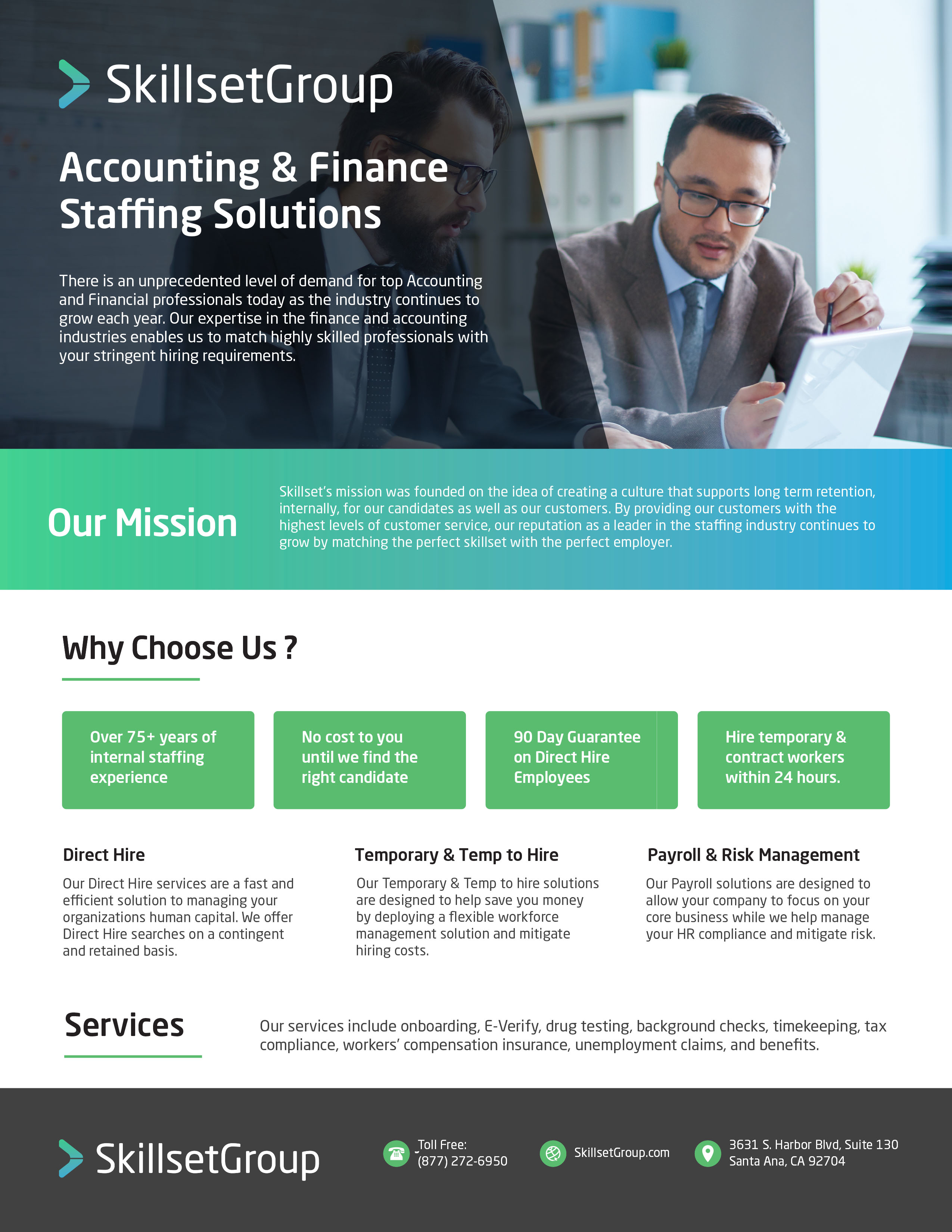It would be hard to work in the accounting and bookkeeping fields without knowing at least a little bit of Quickbooks experience. Given that up to 80 percent of U.S. businesses use some version of this software, accurately listing your Quickbooks experience on your resume is vital to getting your job application the best shot at acceptance.
Quickbooks publishes several different versions of the ubiquitous accounting software, so you first need to be specific about which one you have experience in.
Furthermore, if you have a gap of even a year or two since your last Quickbooks experience, you should brush up. Quickbooks publisher Intuit, like all major software makers, rolls out functionality updates regularly that can make the interface unfamiliar at first.
At SkillsetGroup, our recruiters test every candidate on their business software skills to make sure they’re up-to-speed before we send them to our clients for interviews. Unlike other staffing companies, however, we go over the test results with our candidates so they know their strengths and weaknesses.
Even if a candidate doesn’t have quite the Quickbooks experience level needed, it’s worth the extra effort to explain where their shortcomings were. Maybe next time a job comes open, they’ll have acquired the right skillset to make it their career.
What Is Quickbooks?
If you’re looking for an accounting or finance job and you don’t know Quickbooks, learn it.
The software behemoth Intuit makes Quickbooks, TurboTax, the Mint personal finance app and other accounting software brands.
Intuit products like Quickbooks and Quickbooks Online, QuickbooksADP, etc., make up about 80 percent of the accounting software market for small and medium sized businesses (that’s 82,400 businesses in the U.S.), according to the market research firm InfoClutch.
Intuit incorporated in the 1980s, but as the popularity of their flagship personal finance program Quicken exploded in the 1990s, Intuit went public. Soon, they transformed Quicken into Quickbooks, and marketed it for small business accounting as well as personal finance.
The friendly, visually appealing interface complete with automatically rendered graphs and data visualizations soon became the standard for small- to medium-sized businesses in the U.S. Updates over the past decades have expanded the capabilities of the Quickbooks system to encompass all the accounting, tax and reporting functions necessary to run most businesses.
How Hard Is it to Learn Quickbooks?
Part of the reason Quickbooks is so popular is because it has the functionality of an accounting system designed for a Fortune 500 company, but parses the financial data in a visual interface that’s user friendly for people who aren’t primarily accounting pros.

But that doesn’t mean you can jump into a job that requires Quickbooks experience and figure it out as you go – especially if you have a gap between the job you’re applying for and the last time you used Quickbooks.
Though it was first designed for non-accountants, now the reporting capabilities, audit trails and other advanced accounting functions means Quickbooks is a complex tool that deserves training and practice to use effectively.
What Quickbooks Experience Do Employers Look for?
As stated, Quickbooks is a powerful tool with myriad functions that can allow it to organize the financial and accounting data of firms in any industry. Below are some of the tools within the program you should know how to use, depending on your industry and the type of position you’re applying for.
What Is the Basic Quickbooks Experience Employers Look for?
Every business has bills to pay, income and expense to track, etc. These are the foundational skills for using Quickbooks:
- Bill Management
- Bill Pay
- Income and Expenses
- Cash Flow
What are Quickbooks Workforce/HR Skills Employers Look for?
Businesses that use full-time employees or contractors need to track their hours and pay them and handle their taxes. Quickbooks centralizes all those functions. These are great tools to know if your job is in HR or HR-adjacent.
For instance, you can set up your payroll system within Quickbooks to calculate and pay all state and Federal taxes automatically, and also have the system pay your people on-schedule with minimal human interaction, according to Intuit.
Not only is Quickbooks used for payroll but also for managing invoices and payments for contractors, vendors, freelancers, and any payments you or your company might make to an outside source.
Quickbooks workforce management functions include:
- Payroll
- Expenses
- Timekeeping
- Mileage Tracking
- Contractor or vendor invoice payments
- Managing user permissions (for multiple internal employees using Quickbooks)
- Inventory and Sales tracking
- Reporting (of all transactions across a business)
What are Quickbooks Sales and Retail Skills Employers Look for?
Whether you sell B2B services or are a retail outlet, you need to track your sales. Quickbooks can handle all these tasks.
For example, advanced users should be able to integrate Quickbooks with different third-party POS plugins to allow you to seamlessly accept payments, calculate and pay the sales tax and feed the transaction data into your accounting records, all immediately as the customer swipes their debit card.
When listing this experience on your resume, don't forget to list any freelance or consulting work you may have done that required the use of Quickbooks. This experience is still very applicable to any employment opportunity that would require using the same skills.
Here are some of the other sales and retail functions of Quickbooks you should be familiar with:
- Sales
- Tag Transactions (to track a certain type of transaction and generate data insights)
- Multi-Channel Commerce (integrating data and income from sales across multiple ecommerce channels)
- Generate Estimates
- Invoicing, including Batch Invoicing
What are Quickbooks Tax Skills Employers Look for?
All businesses have to pay taxes (or do the right reporting every year to get out of paying them). If you’re looking for a tax accounting job, you should know how to set up and operate automatic receipt tracking that allows employees to snap photos with their cellphones and categorize expenses as deductions so Quickbooks records them as such automatically, for example.
You should also be able to import and export related tax record documents like paid invoices, etc. with no friction.
Quickbooks tax functions include:
- Automatic Payroll Tax Calculations
- Automatic Sales Tax Calculations
- Tax Deductions
- Live Bookkeeping
What Quickbooks Strategy and Analysis Skills do Employers Look for?
If your business generates large sets of transactions and income-expense data, why wouldn’t you examine it to save money and resources?
Quickbooks allows you to take all your financial data and see it from a bird’s-eye-view. If you’re seeking a career in financial management or as a business analyst, learning these tools within Quickbooks is vital.
As an advanced Quickbooks user, you should be able to handle the following:
- Use dashboards and metrics to analyze cash flow, profitability and other key performance indicators (KPIs)
- Quickly snipe out inefficiencies by setting up auto-monitoring of KPIs
- Generate advanced reports with attractive graphs suitable for presentation.
Job titles that use Quickbooks skills
Finally, here are some commonly use job titles that regularly use one or another of the functions of Quickbooks that we've discussed here. If you see one of these job titles is being hired for and you have the Quickbooks skills we have outlined here, you may be qualified for the position!
- Accountant
- Accounts Receivable/Accounts Payable (AR/AP)
- Accounting Clerk
- Assistant Controller
- Audit Clerk
- Bookkeeper
- Payroll Administrator
- Payroll Clerk
- Payroll Specialist
If you are in need of more help finding your next accounting role, reach out to us today! SkillsetGroup staffs any number of accounting and clerical roles and we'd be happy to help you make your next career move!


